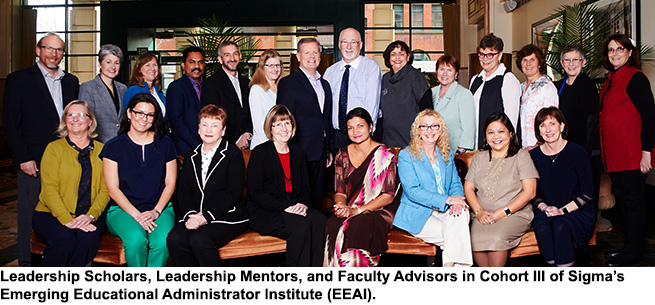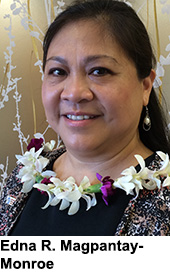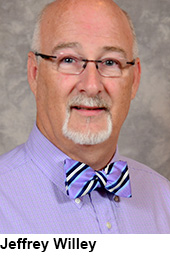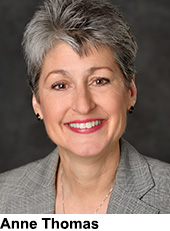Edna Magpantay-Monroe, Jeffrey Willey, and Anne Thomas | 7/31/2018
Reflections of Scholars, Mentors, and Faculty Advisors.

One of a series of updates by participants. The experience develops and inspires nurse faculty in their early administrative careers.
Leadership Scholar diary: Edna R. Magpantay-Monroe
 I attended the 44th Biennial Convention of Sigma Theta Tau International Honor Society of Nursing (Sigma)—held 28 October to 1 November 2017 in Indianapolis, Indiana, USA—as a delegate for Gamma Psi at-Large Chapter.
I attended the 44th Biennial Convention of Sigma Theta Tau International Honor Society of Nursing (Sigma)—held 28 October to 1 November 2017 in Indianapolis, Indiana, USA—as a delegate for Gamma Psi at-Large Chapter.
Like any convention, great information was presented. I stopped by the Sigma booths and was quite intrigued with information about the different institutes Sigma offers. At the time of the conference, I had started serving as chief nurse administrator for Chaminade University of Honolulu, a Catholic Marianist university and Native Hawaiian serving school. I thought about applying for the Emerging Educational Administrator Institute (EEAI), but I did some investigating first. The most challenging part of my application was finding a mentor. In the end, Sigma matched me with a mentor whom I happen to know.
When my application was accepted as a Leadership Scholar, I was excited but worried. At my first workshop in March 2018, I met Leadership Scholars, Faculty Advisors, and Leadership Mentors who are very warm and down-to-earth. Our cohort met for dinner the night before the workshop so we could start getting acquainted. This first meeting really set the stage for a more relaxed and engaging workshop. Our workshop was very hands-on and provided a good opportunity for us to reflect and appreciate who we currently are as leaders and our aspirations for the future. The foundation for strong leadership has started.
I have been a registered nurse for over 30 years and have been in leadership positions primarily in clinical settings. I know that leadership in academia is different, so I decided to embark on the EEAI Leadership Scholar journey. I am a learner at heart and know there is always room for growth, both professionally and personally. During our first workshop, I was reminded of the importance of understanding “me”—my personality, my leadership style, my conflict management, and, most of all, my self-care. Sometimes it is not pleasant to assess and validate who I am, but the purpose of these tools is to help make us better.
As a Leadership Scholar, I am privileged to have two great people to support my journey: Dr. Pegge Bell, Faculty Advisor, and Dr. Julie Johnson, Leadership Mentor. They have become not only a listening ear but also a voice of motivation. They understand my time restrictions, my interests, and, most of all, my challenges. They have also provided advice during moments when I am vulnerable and when I am successful.
After some revisions to my project, I chose to focus on “Building a Framework for School of Nursing Excellence: A Marianist Way.” This project is timely as our school of nursing was just granted 10-year accreditation for our baccalaureate degree program, meeting all four accreditation standards with no compliance concerns. Now is the time to assess what we are as a school of nursing in everything we do—from admission of students to our graduates—not just in relation to accreditation standards but what we are as a university that serves primarily Native Hawaiians and Pacific Islanders and first-generation college students. Are we being true to our mission and vision? As an emerging educational administrator, I strongly value being student-centered, which makes my journey as a Leadership Scholar very important. I hope to continue to have the courage to lead with the heart.
Edna R. Magpantay-Monroe, EdD, APRN, is chief nurse administrator and professor at Chaminade University of Honolulu in Hawaii, USA, and a member of the Marianist Educational Associates community at Chaminade. She is president of Sigma’s Gamma Psi at-Large Chapter.
Leadership Mentor diary: Jeffrey Willey

When asked to be a mentor for the Emerging Educational Administrator Institute (EEAI), I was delighted that I could pass on some of the knowledge I had been afforded during my administrative leadership journey.
In the past, several individuals have served as my mentors, including my former chair, Dr. Lisa Seldomridge; my former dean and now interim provost, Dr. Karen Olmstead; and many faculty within and external to nursing. The list is too exhaustive to mention here.
My possible mentee, Dr. Caroline Peltz, emailed me to see if we could have a short phone conversation to determine if we were a good “fit” for each other. What a brilliant idea, I thought. Wow, here I am going to be the mentor, and I am already learning from my mentee—good start! This is also a recommendation by Starr (2014) for setting the second stage of mentoring.
My mentee and I had a phone call and went through our histories, education, and positions during our careers as nurses and educators. We shared our CVs and discussed her goals for the EEAI program to make sure I could help in the role of mentor. We decided it was a good match. Together with our faculty advisor—Dr. Karen Morin, past president of Sigma—we began our journey as a triad.
One of the things I have learned throughout my experience in leadership is that one learns from everyone. I am constantly learning about leadership from other leaders. What has now come to me, though, is that I also learn to lead from everyone with whom I come in contact, including faculty, staff, and the public. Some of the lessons I gather are worth including in my repertoire, while others are a learning experience of what not to include—but still remember. I told my mentee when we discussed the possibility of working together that I was expecting to learn as much from her as she would from me.
We are now, according to Starr (2014), in the third phase of the mentoring process—navigating or maintaining progress. We schedule monthly meetings together as well as monthly meetings with Dr. Morin. The meetings between the two of us keep us on track with her proposed project to meet the requirements set up by the EEAI. Having structure is important as it allows us to see the achievement of goals.
Mentoring is an ongoing process. I am happy to have had the individuals I mentioned earlier as my mentors. They have guided my path along the way and have given me much more than they will ever know. I am extremely appreciative and thankful for the help they have given me—even when they didn’t know they were doing anything. You see, that’s one thing about mentoring: It happens even when you’re not looking.
As our triad continues through the last two of five phases mentioned by Starr (2014), I am looking forward to our interactions, growth, and continued shared learning. The EEAI is instrumental in preparing future academic leaders for the nursing profession, and I am very happy to take part in preparing new nursing academic leaders.
Jeffrey Willey, PhD, RN, CNS, CLNC, CNE, is director of the School of Nursing at Salisbury University in Salisbury, Maryland, USA.
Reference:
Starr, J. (2014). The mentoring manual: Your step by step guide to being a better mentor. Harlow, England: Pearson.
Faculty Advisor diary: Anne Thomas
 The Emerging Educational Administrator Institute (EEAI) is an amazing opportunity for new faculty administrators to be mentored in a supportive environment for 18 months. The institute uses the Triad Model, consisting of the Leadership Scholar (new faculty administrator), Leadership Mentor, and Faculty Advisor. Coordinated activities, projects, programs, and webinars guide the Leadership Scholar through a journey to develop administrative skills in research, teaching, or service.
The Emerging Educational Administrator Institute (EEAI) is an amazing opportunity for new faculty administrators to be mentored in a supportive environment for 18 months. The institute uses the Triad Model, consisting of the Leadership Scholar (new faculty administrator), Leadership Mentor, and Faculty Advisor. Coordinated activities, projects, programs, and webinars guide the Leadership Scholar through a journey to develop administrative skills in research, teaching, or service.
As a Faculty Advisor, I work with two Leadership Scholars on a regular basis. Usually, our work includes monthly phone conference calls or Zoom meetings; email exchanges; and critiques of business plans, project documentations, and presentation slides, among other items.
At the beginning of the program, Leadership Scholars create goals for their learning, identify a leadership project, and develop their leadership trajectory. This is such a wonderful time because EEAI provides Leadership Scholars with the rare opportunity to invest in their professional journey while having robust resources at their fingertips. I have found that EEAI Leadership Scholars are similar to new students—the scholars want to accomplish projects that solve really complex and large problems with high impact and exceptional quality. My role as the Faculty Advisor is to guide their enthusiasm into goals and projects that can be achieved in 18 months, while providing a solid foundation for their administrative career paths.
As I constantly remind them, this is an evolving journey. The project is the first application of all the things they learn during their time with the institute.
Other significant components of my role as Faculty Advisor are to provide a safe space for Leadership Scholars to ask questions, try out new ideas, role-play crucial and difficult conversations, identify resources that can be used to meet their learning and project goals, provide networking opportunities that expand their professional reach, and facilitate attainment of an “administrative toolkit.”
Administrative transitions, life balance, prioritization of goals, self-care, boundary setting, and reflective time are also topics that we focus on frequently. I truly enjoy the rich discussions about role-modeling leadership skills that Leadership Scholars want their faculty and colleagues to emulate. Work environments often reflect the values of their leaders. I have the scholars do some “exercises” on what their verbal and nonverbal actions, word choices, emailing habits, and affirmation rituals may be conveying to their colleagues. Are they sending the message they want, or do they need to refine their skills?
One of the most enjoyable things about being a Faculty Advisor is facilitating the growth of Leadership Scholars through their leadership project journey. Goals, timelines, and budgets are created; professional presentations to stakeholders are developed; and single work products join to become the completed project. Finally, the abstract is written and submitted, and the project is presented at the Sigma biennial convention. The scholar’s process of discovery, self-reflection, strength-building, and engagement with numerous new colleagues is a humbling experience. It is my privilege to be able to share and experience the journey with them.
If you are interested in this opportunity, more information is available here.
Anne Thomas, PhD, ANP-BC, GNP, FAANP, is associate dean for academic affairs at Michigan State University College of Nursing.